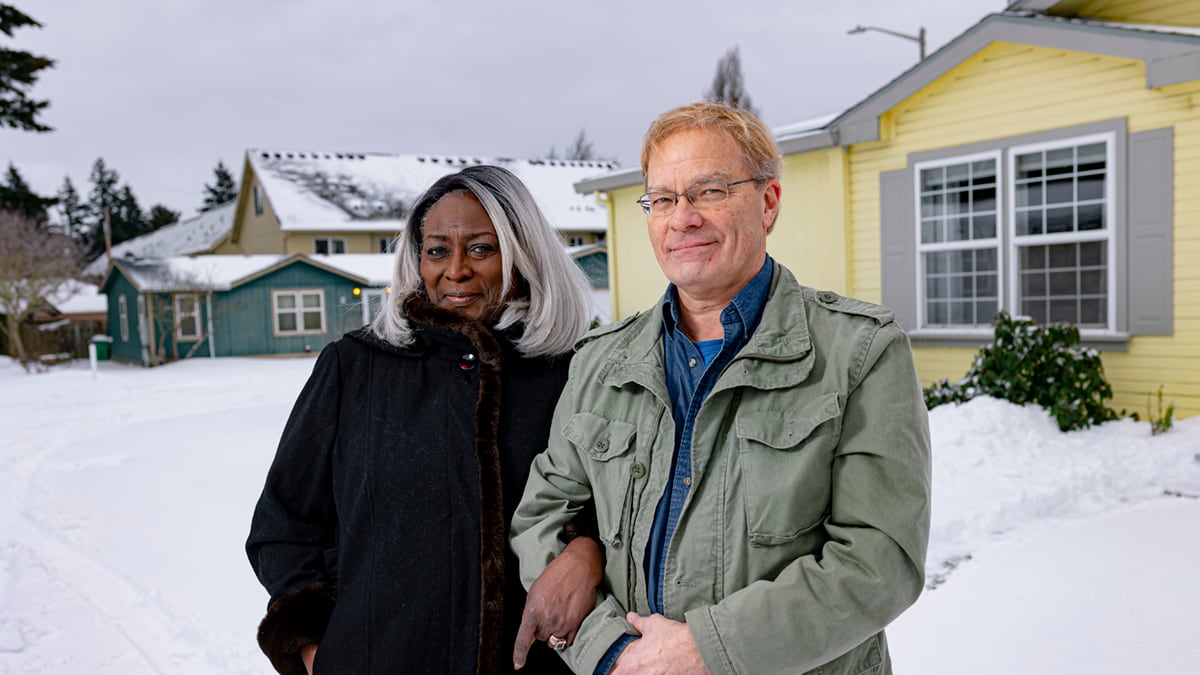Across the country, particularly in Portland and Oregon, elected officials have tried to ward off evictions and foreclosures during the COVID-19 pandemic—sometimes by banning them outright.
But in one low-income community in East Portland, the holes in several layers in the social safety net became evident when a letter arrived in mailboxes.
Last October, residents of 11 homes in a mobile home park along Southeast Powell Boulevard received notice they'd have to move out. The owner of Kelly Butte Place, on Southeast 112th Avenue, wanted to redevelop the property.
For Beverly Smith, 74, the bad news seemed to defy logic. First, the notice arrived in the middle of a pandemic and amid a thicket of new rules designed to prevent people from being displaced.
Second, Smith and her husband, Philip, own their home.
"We're looking for somebody to assist us. We need help, that's what it boils down to," Beverly Smith says. "They've got all these plans about how they're shuffling us around like domino chips."
Manufactured home parks offer a form of homeownership often within reach of low-income buyers—but it means owning only the structure, not the land under it. So it's housing that comes with the added insecurity of losing an investment if the homes, sometimes old, can't be moved or the cost of moving, sometimes upward of $40,000, proves prohibitive.
The state has long recognized the need to protect mobile home park residents, requiring long notice periods before closure. In August 2018, Portland took the added step of zoning existing locations specifically as mobile home parks, so that they could not be closed and rezoned without significant review.
The difference for Kelly Butte Place was that the owner, Adam Hoesly, had applied to redevelop the property less than two months before the city changed the zoning.
Hoesly sought to build 26 "affordable" single-family homes. To do this, he'd likely have to demolish any homes that the owners left behind.
He tells WW he plans to move forward. "As it currently stands, tenants have been given more than a years notice as well as relocation fees to aid in their transition," Hoesly says. "The plan is to replace the 11 mobile homes with 26 affordable homes, as defined by the City of Portland."
If the Kelly Butte development were to proceed, it would do exactly what the Portland City Council is actively working to avoid, says Cameron Herrington, a program manager with the nonprofit Living Cully, which helped advocate for the mobile home park ordinance. "It's blatantly against the spirit of what the City Council was trying to do."
Tenants rights advocate Margot Black has been organizing the residents of Kelly Butte Place throughout the winter.
"The city knew in 2018 that these tenants were going to be displaced and did nothing," Black says. "They had no plan."

It was only after inquiries by WW that the city canceled the permits to redevelop Kelly Butte Place.
On Jan. 19, Matt Tschabold, policy and planning manager with the Portland Housing Bureau, told two residents who addressed the bureau's Rental Services Commission that since permit applications were submitted before the ordinance went into effect, it could still be approved.
"A property owner is subject to the land use and zoning code that is in effect when they submit an application, and unfortunately the city does not have the discretion to change that state law," Tschabold said at the January commission meeting. "Their application is subject to the laws that were in effect when they submitted that application."
WW contacted City Commissioner Dan Ryan's office on Feb. 8 and the Portland Bureau of Development Services on Feb. 10, inquiring whether the city would in fact approve the application. (Ryan oversees BDS as well as the Housing Bureau.)
On Feb. 14, David Kuhnhausen, BDS's permitting services manager, told WW the permits had been canceled, saying the property owner had failed to request the necessary permit extensions to keep the application valid.
"The permits were canceled on Feb. 8, 2021," Kuhnhausen wrote to WW. "Any future development permits at this site will be reviewed to comply with current zoning regulations."
The permits expired more than seven months ago, on June 30. It's not clear why the permits weren't canceled then.
Hoesly says he received no notice the permits had expired. "The city at times has an antiquated system for alerting the status of permits and I was not notified that the permit had expired in June until late last week," he says.
The permit cancellation is good news for Lucenda and Joe Brisack, who bought the home they share with their 8-year-old daughter on Dec. 30, 2018. That was nearly six months after the application for redevelopment was submitted.
"It's the worst feeling in the world that someone looked into our face, knowing that we were giving every cent we had to buy this place to give our daughter a home and stability, and they never said anything," Lucenda Brisack says.
In this small cul-de-sac, with bright, pastel-colored homes and neatly decorated front porches, resides a tight-knit community that considers itself a family. When residents received letters telling them the mobile home park, developed in 1997, would close and they had to be off the property by Oct. 20, 2021, community members feared for their futures but decided to put up a fight by writing letters to public officials and testifying at the Rental Services Commission meeting.
Black, the tenants rights organizer, says the city's decision to cancel the permits is significant but the owner could still kick residents off the land even if he can't redevelop the property.
"The city knows when displacement occurs or is about to," Black adds. "It needs to start providing meaningful and proactive resources to prevent and mitigate it."
Most of the residents could not afford to relocate their homes. Sandra Lovingier bought hers in 2009 and wrote in a handwritten letter to WW that she's confident she'd end up homeless if she had to vacate the property since she can no longer work because she has multiple sclerosis.
"I put all my retirement money into buying my home," she wrote. "I've invested every dime to make this my forever home."
Families still paying off their homes will have to continue paying their mortgages regardless of whether they can afford to move them.
Collectively, the residents offered the landowner $1.1 million to buy the land themselves but never received a response, Beverly Smith says.
"It's really frustrating to be blatantly treated like you don't matter," Smith says. "The city is supposed to be empathetic to the homeless. They're everywhere in this city. If they're having difficulty, what's going to happen to us? We're seniors."
Correction: This story initially used the name Kelly Butte Park to refer to the mobile home park. While the park is referred to by several names in documents, it is registered with the state as Kelly Butte Place. WW regrets the error.

